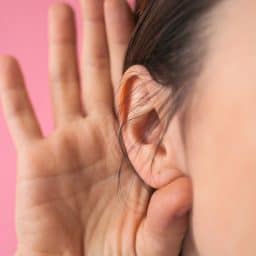Surgery of the eardrum, middle ear and mastoid
Some problems of the ear are treated with medication and some are treated with surgery. Your condition may be best treated with surgery and this brochure provides information about the normal ear, certain conditions affecting the ear, and the types of ear surgery. The Normal Ear: The ear has 3 parts: Each part performs an…
GERD and LPR
What is GERD? Gastroesophageal reflux disease, often referred to as GERD, occurs when acid from the stomach backs up into the esophagus. Normally, food travels from the mouth, down through the esophagus and into the stomach. A ring of muscle at the bottom of the esophagus, the lower esophageal sphincter (LES), contracts to keep the…
Otosclerosis and Stapedectomy
Otosclerosis is a disease that causes progressive hearing loss and affects the bone of middle and inner ear. It is often surgically reversible. Otosclerosis causes abnormal bone to deposit around the stapes and sometimes cochlea. As this bony deposit accumulates, it restricts the normal movement of the third bone of hearing (the stapes “stay-peas”). This…
Otitis Media and PE Tubes
Otitis media means inflammation of the middle ear usually caused by infections. Otitis media can affect one or both ears and may lead to pain, hearing loss, speech and language delay. How Does the Ear Work? The outer ear collects sounds. The middle ear consists of the ear drum and three small ear bones. It…
Deviated Septum, Nasal Obstruction, Septoplasty and Turbinoplasty
This page provides information about various conditions affecting the nose and sinuses. Nasal Anatomy & Function The inside of the nose is a complex area with intricate anatomy (structure) and physiology (function). Our nose is important for breathing, smell and taste, and sinus function. One important part is the nasal septum which is the wall separating the…
What is Unilateral Hearing Loss?

What is Single Sided Deafness? Sometimes referred to as unilateral hearing loss, single sided deafness is a condition in which an individual experiences hearing loss in only one ear but can hear normally out of the other ear. While most patients with a hearing impairment suffer from bilateral (two-sided) hearing loss, SSD affects approximately 60,000…
What is Sudden Hearing Loss?

For most people who experience hearing loss, the condition comes on gradually over a period of years. In rare cases, an abrupt loss of hearing occurs with little or no warning. This condition is known as sudden sensorineural hearing loss (SSHL). What is Sudden Deafness? Sudden deafness is an unexplained and rapid hearing loss that…
What is Noise Induced Hearing Loss?

How Can Sounds Hurt Your Ears? Background sound is a constant in our busy lives. Normally, background noises are at safe levels that do not negatively impact our hearing. But repeated exposure to noise above 85 decibels (dB) can cause noise induced hearing loss. The louder the sound, the less amount of time it takes…